Oregano's powerful compounds, carvacrol and thymol, act as nature's preservatives to extend your food's shelf life. When you add oregano to your dishes, it creates a hostile environment for harmful bacteria, fungi, and viruses, eliminating up to 99.9% of dangerous microorganisms within an hour. You'll find it particularly effective in high-fat foods and meats, where it prevents rancidity while maintaining flavor and nutrients. Its natural antioxidants work like synthetic preservatives but without artificial additives, making your food both safer and healthier. There's much more to discover about this remarkable herb's preservation powers.
Nature's Most Powerful Food Preserver
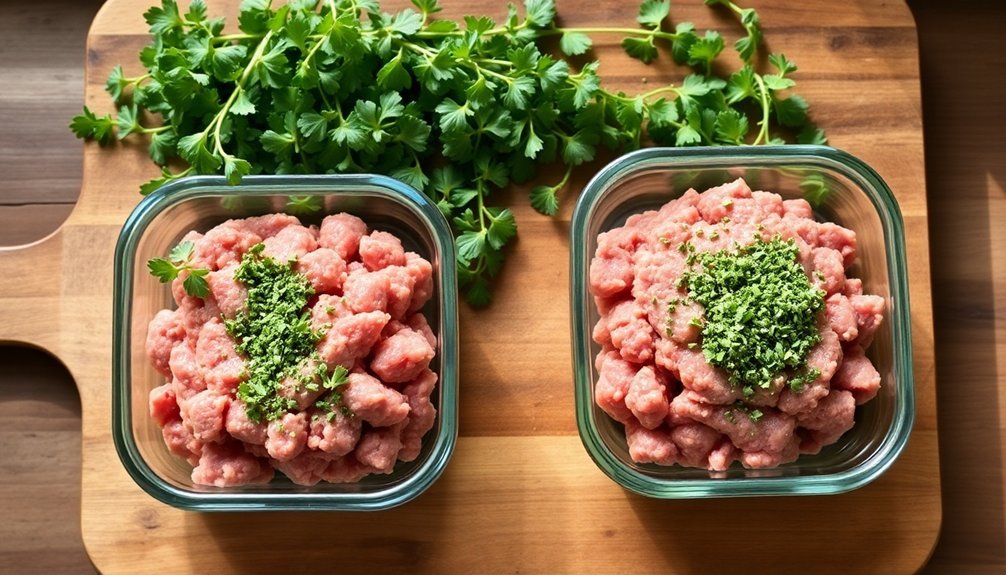
Through generations of traditional use and modern scientific validation, oregano stands out as one of nature's most powerful food preservatives. You'll find its effectiveness rivals synthetic preservatives, particularly in how it prevents food spoilage through multiple mechanisms. The herb's high antioxidant content, featuring compounds like carvacrol and thymol, effectively neutralizes free radicals that cause food deterioration. Studies show that microencapsulated essential oils remain more stable and effective over time compared to free oils.
When you're looking to extend your food's shelf life naturally, oregano works by inhibiting yeast and mold growth while simultaneously reducing lipid oxidation. You can depend on it to work especially well in flour-based products, where it's as effective as calcium propionate, a common synthetic preservative.
What makes oregano particularly valuable is that you're not just preserving your food – you're also adding significant health benefits to your meals.
You'll get the most preservation power by properly storing your oregano. Whether you're using it fresh, dried, or as an oil, keep it in airtight containers away from heat and light. This guarantees you maintain both its preservative properties and its rich concentration of essential oils that make it such an effective natural food preserver.
Understanding Oregano's Antimicrobial Properties
At the heart of oregano's preservation power lies its remarkable antimicrobial properties. This versatile herb contains potent compounds, primarily carvacrol and thymol, that effectively combat bacteria, fungi, and viruses. You'll find that oregano oil can fight against tough bacteria like MRSA and E. Coli, while also tackling various fungal infections from Candida to athlete's foot. The oil's antioxidant effects help prevent food deterioration and cellular damage.
| Microorganism Type | What Oregano Oil Does |
|---|---|
| Bacteria | Kills drug-resistant strains & reduces wound infection bacteria by 99.9% within an hour |
| Fungi | Combats 23 different species, including Candida & nail infections |
| Viruses | Inactivates 90% of herpes simplex & norovirus within one hour |
When you're looking to preserve food naturally, oregano's triple-threat approach makes it exceptionally effective. It's particularly powerful in the gut, where it fights harmful bacteria while protecting food quality. Research shows it can prevent spoilage better than many synthetic preservatives, making it an excellent choice for natural food preservation. You'll find these properties especially useful in extending shelf life without relying on artificial additives.
The Science Behind Preservation
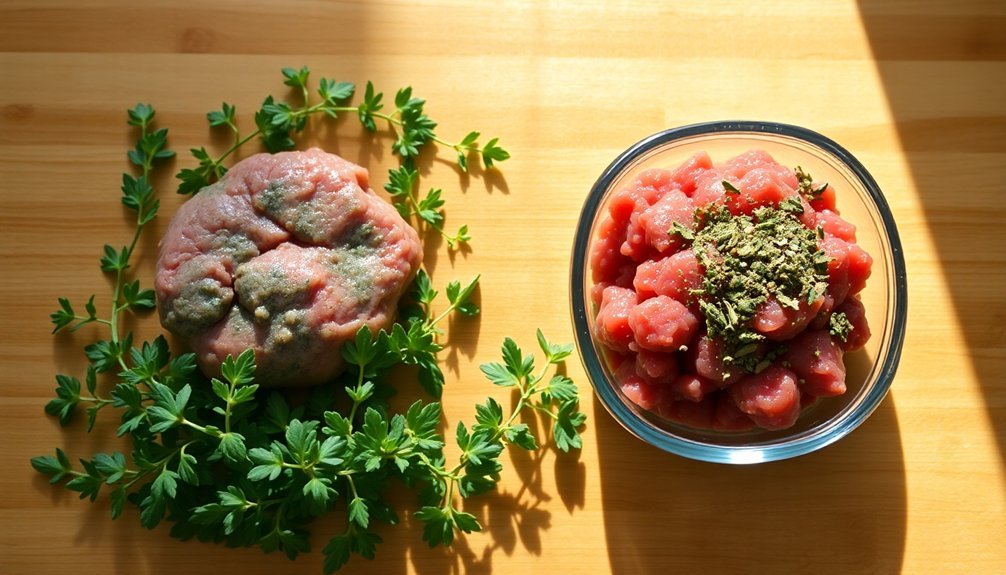
You'll find that oregano's preservation power comes from its potent antimicrobial compounds that actively fight harmful bacteria in food products.
The herb's natural antioxidants, particularly carvacrol and thymol, work to prevent oxidative damage and rancidity, maintaining food freshness with effectiveness comparable to synthetic preservatives.
Oregano's complex phytochemicals create an environment that stops microbial growth, making it especially useful in extending the shelf life of flour-based products, meats, and dairy items. Research shows oregano essential oil can inhibit 23 species of bacteria, demonstrating its exceptional food preservation capabilities.
Antimicrobial Compounds Fight Bacteria
Understanding oregano's preservation power starts with its remarkable antimicrobial compounds, particularly carvacrol and thymol found in oregano essential oil (OEO). These compounds work by penetrating bacterial cell membranes, disrupting their function and ultimately preventing harmful microorganisms from growing in your food.
You'll be amazed by OEO's broad-spectrum effectiveness against common food pathogens. It's especially potent against gram-positive bacteria, with scientific studies showing it can inhibit the growth of dangerous bacteria like E. coli, Salmonella, and Listeria at concentrations as low as 0.24 mg/mL.
Here's what makes oregano such a powerful natural preservative:
- It attacks bacteria by making their cell membranes permeable, fundamentally breaking down their defensive walls.
- It fights multiple threats simultaneously, targeting bacteria, fungi, and even some viruses.
- It prevents bacterial communication through quorum sensing inhibition, reducing their ability to cause food spoilage.
When you add oregano to your food, you're not just adding flavor – you're creating an invisible shield against microorganisms that cause spoilage, helping your meals stay fresh and safe for longer periods.
Natural Antioxidants Prevent Spoilage
While oregano's antimicrobial properties fight dangerous bacteria, its natural antioxidants work as another line of defense against food spoilage. You'll find powerful compounds like carvacrol and thymol in oregano that prevent oxidation, which is especially important for foods high in fats and oils. These natural preservatives work just as effectively as synthetic alternatives like BHA and BHT, but without the health concerns.
When you're looking to extend your food's shelf life, oregano extract offers multiple benefits. It protects vitamins and amino acids from oxidative damage while preventing the development of off-flavors and rancidity. You won't notice any significant changes in taste or texture when it's added to your food products.
| Preservation Aspect | Oregano's Role | Benefit to You |
|---|---|---|
| Oxidation Control | Inhibits lipid oxidation | Prevents rancidity |
| Nutrient Protection | Guards vitamins & amino acids | Maintains food value |
| Shelf Life | Delays spoilage | Extends storage time |
Food manufacturers can integrate oregano extract into various products, from bread to other baked goods, using advanced processing techniques that maintain its antioxidant properties. This natural preservative meets the growing consumer demand for fewer artificial additives while ensuring food safety and quality.
Phytochemicals Stop Microbial Growth
Packed with powerful phytochemicals, oregano's natural compounds work through multiple mechanisms to stop harmful microbes in their tracks. When you add oregano to your food, two key compounds – carvacrol and thymol – lead the charge against bacteria, yeasts, and fungi. These compounds target microbial cell membranes, causing them to leak and ultimately destroying harmful organisms that could spoil your food.
You'll find oregano's antimicrobial action particularly effective because it:
- Disrupts biofilms that allow bacteria to stick to surfaces
- Interferes with bacterial communication systems (quorum sensing)
- Attacks multiple cellular targets simultaneously, making it harder for microbes to develop resistance
What makes oregano especially valuable for food preservation is its broad-spectrum activity. You can count on it to fight common foodborne pathogens like Salmonella and various fungi that cause spoilage.
Even better, you don't need much – concentrations as low as 4 mg/mL can effectively inhibit certain fungi. When combined with other natural preservatives, oregano's effectiveness increases even further, making it an excellent choice for keeping your food fresh naturally.
Fighting Food Spoilage Naturally
You'll find oregano's natural defense systems are remarkably effective at fighting food spoilage through its powerful antimicrobial compounds, carvacrol and thymol.
These compounds work together to block harmful bacteria like E. coli while oregano's antioxidants prevent oxidative damage that leads to food deterioration.
Whether you're using fresh leaves, dried herbs, or concentrated essential oils, oregano's protective properties make it a versatile choice for naturally extending the shelf life of your foods.
Oregano's Powerful Protection Systems
Nature's powerful defense mechanisms shine through in oregano's remarkable ability to fight food spoilage. You'll find that oregano's protection systems work through multiple pathways to keep your food fresh and safe. The herb's antioxidants, particularly carvacrol and thymol, actively combat harmful free radicals that can cause food to deteriorate.
- You're getting powerful antioxidant protection that not only preserves the food but also helps prevent chronic diseases when you consume oregano-preserved foods.
- You'll benefit from the herb's anti-inflammatory properties, which work together with antioxidants to reduce oxidative stress and prevent microbial growth.
- You can maximize oregano's preservative power by properly dehydrating and storing it in airtight, opaque containers.
When you're storing oregano, it's essential to keep it in a cool, dark place to maintain its protective compounds.
By combining oregano with other antioxidant-rich foods, you're creating an even stronger preservation system. Regular checks of your stored oregano help guarantee it maintains its potency, and proper labeling helps you track freshness.
With these protective systems working together, you're harnessing oregano's full preservation potential.
Natural Defense Against Bacteria
Bacterial invaders don't stand a chance against oregano's formidable defense system. When you add oregano to your food, you're enlisting one of nature's most powerful antimicrobial agents, proven effective against numerous bacterial species including E. coli and Salmonella.
You'll find oregano's essential oil particularly impressive, as it disrupts bacterial cell membranes through active compounds like carvacrol and thymol. These natural warriors don't just stop at one type of bacteria – they're effective against a broad spectrum of harmful microorganisms, with minimum inhibitory concentrations ranging from 94 to 754 μg/cm³.
What makes oregano especially practical for your kitchen is its versatility. You can use it to protect food-contact surfaces, where it effectively reduces bacterial counts even in the presence of food residues like beef extract.
When you're preserving flour-based products, oregano extract works as effectively as synthetic preservatives, matching the performance of calcium propionate. You're also getting an added bonus: oregano's antioxidant properties help prevent oxidative rancidity, making it a dual-action defender of your food's freshness and safety.
Freshness Through Essential Oils
Essential oils extracted from oregano consistently demonstrate remarkable preservation power through their dual-action approach to food protection. When you're looking to keep your food fresher longer, oregano essential oil (OEO) works through both its antioxidant properties and antimicrobial effects. The oil's primary compounds, carvacrol and thymol, actively fight against oxidation while disrupting harmful bacteria's cell membranes.
- You'll find OEO effectively stops the growth of dangerous bacteria like E. coli and Salmonella, making your food safer to consume over longer periods.
- The oil's powerful antioxidants protect your food's nutrients by preventing lipid oxidation, especially in meats like beef and chicken.
- You can benefit from OEO's preservation power through innovative packaging, where it's incorporated into bioactive films that protect your food.
What makes OEO particularly effective is its ability to work with other natural preservatives. When you combine it with other essential oils like cinnamon or lemongrass, you'll get even stronger preservation effects.
This natural preservation method isn't just effective – it's also sustainable, as these bioactive films are biodegradable and environmentally friendly.
Practical Uses in Food Storage
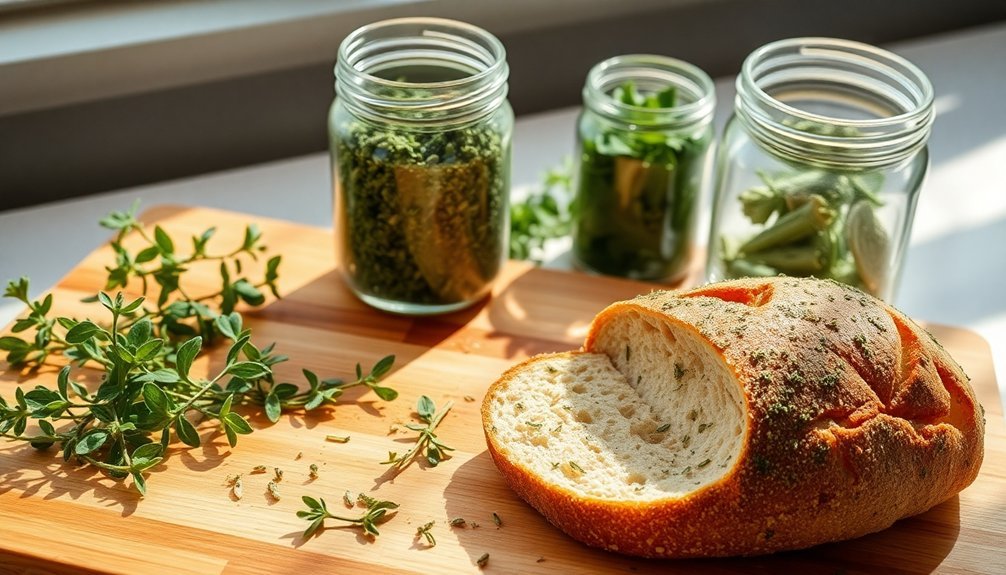
When you're looking to extend food shelf life naturally, oregano offers a powerful solution backed by science. You'll find its antimicrobial compounds, particularly carvacrol and thymol, actively fight against harmful bacteria like E. coli and Staphylococcus aureus, while its antioxidants prevent food spoilage.
You can easily incorporate oregano's preservative power into your food storage routine. Try infusing it in olive oil by combining chopped leaves with high-quality oil, or create oregano-infused vinegar by steeping the leaves in hot vinegar for at least two weeks.
For long-term storage, dry the leaves and keep them in airtight containers in a cool, dark place. You'll get the best results by adding oregano to high-fat foods, meats, and marinades. It's particularly effective when combined with other herbs and spices, enhancing both preservation and flavor.
If you're storing frozen foods like lamb burgers, oregano's antioxidants will help maintain quality during storage. Remember to check your stored oregano regularly for freshness, and you'll always have this natural preservative ready for use.
From Garden to Kitchen Shelf
Taking oregano from garden to kitchen starts with understanding the ideal growing conditions. You'll want to plant your oregano in full sun with well-drained soil, and remember to prune it regularly to encourage bushy growth.
When you're ready to harvest, pick the young leaves for the best flavor and aroma – they'll serve you well in both fresh and dried forms.
When you're shifting your oregano from garden to storage, you've got several preservation options. You can dry the leaves to concentrate their flavor and potency, or create oregano-infused oil that'll last for months when stored properly in a cool, dark place.
Here's why proper handling matters for preservation:
- Fresh oregano contains higher levels of chlorophyll and nutrients than dried versions
- The herb's natural antimicrobial properties help protect food from spoilage
- Its antioxidants work best when properly preserved, protecting fats from oxidation
Whether you're using it fresh or dried, timing matters in cooking. Add dried oregano early in the cooking process to infuse the entire dish, but save fresh oregano for the final minutes to maintain its nutritional benefits and vibrant flavor.
Comparing Traditional and Modern Methods
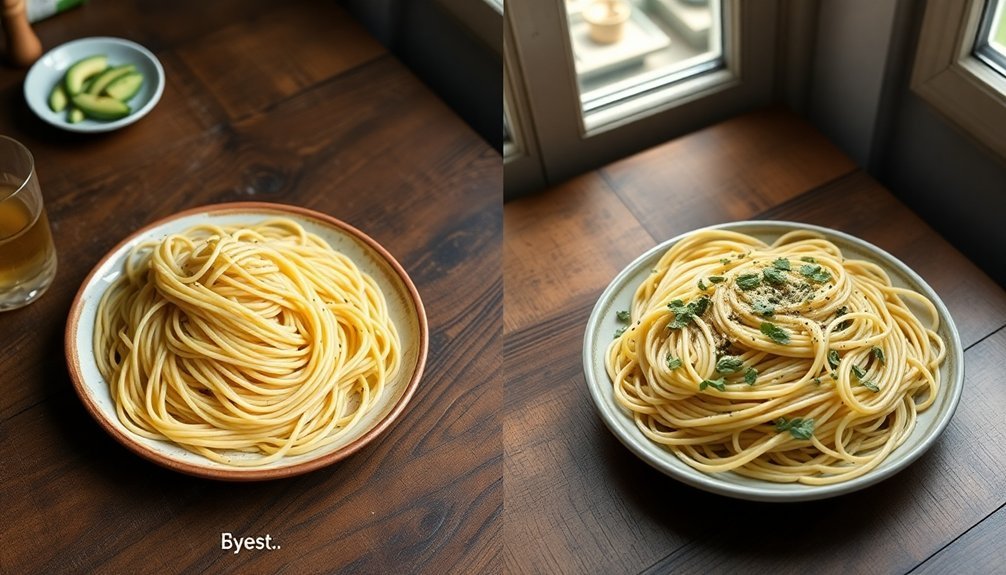
The evolution of oregano preservation spans thousands of years, from ancient sun-drying techniques to today's precise food dehydrators. While our ancestors relied on natural elements like sun and wind to dry their herbs, you'll now find more controlled methods at your disposal.
Traditional air-drying remains effective and cost-efficient – you simply bundle oregano and hang it in a well-ventilated space. When sunlight wasn't sufficient, people used "still houses" with fire to achieve similar results.
However, modern methods offer more precision and convenience. You can now use food dehydrators that maintain ideal temperatures between 95°F and 115°F, completing the process in just 2-4 hours instead of days.
If you don't have a dehydrator, your oven can serve as an effective alternative. Set it to low temperatures (140°F-170°F) and leave the door slightly ajar – you'll have dried oregano in 1-2 hours.
Today's storage solutions have also improved: you'll want to use airtight containers and can even employ data loggers to monitor temperature and humidity.
While traditional methods still work, modern techniques give you more control over the preservation process, helping maintain oregano's potency for up to six months.
Health Benefits While Preserving Food
Scientists have discovered that oregano's remarkable health benefits persist even during preservation. When you add oregano to preserve your food, you're not just extending shelf life – you're also gaining powerful health advantages. The herb's active compounds, particularly carvacrol and thymol, continue working to protect both your food and your health through multiple mechanisms.
- You'll get enhanced antioxidant protection as oregano fights free radicals in preserved foods, helping prevent both spoilage and cellular damage in your body.
- You're adding a natural antimicrobial shield that fights dangerous bacteria like MRSA and other drug-resistant pathogens without developing bacterial resistance.
- You're incorporating anti-inflammatory benefits that can help reduce gastrointestinal inflammation while supporting digestive health.
The preservation process doesn't diminish oregano's ability to maintain a healthy gut microbiome or protect against oxidative stress.
Whether you're using oregano to preserve meat, dairy products, or other foods, you're creating a dual-action benefit: longer-lasting food that's also working to support your overall health. This makes oregano a particularly smart choice for both food preservation and promoting wellness simultaneously.
Frequently Asked Questions
Can Oregano Extract Affect the Taste of Preserved Foods?
Yes, oregano extract can affect your food's taste. You'll notice it can add bitterness and strong flavors, especially at high concentrations. However, you can minimize this by using smaller amounts or adding it later.
How Long Can Oregano-Preserved Foods Be Safely Stored at Room Temperature?
You can safely store oregano-preserved foods at room temperature for 1-4 years if they're kept in airtight containers. For best flavor, you'll want to use them within 6-12 months after opening.
Is Wild Oregano More Effective for Preservation Than Cultivated Varieties?
Yes, you'll find wild oregano more effective for preservation than cultivated varieties because it contains higher concentrations of carvacrol and thymol, the anti-microbial compounds that actively inhibit bacterial growth in your food.
Does Cooking With Oregano Reduce Its Food Preservation Properties?
No, you'll still get strong preservation benefits when cooking with oregano. Its antimicrobial and antioxidant compounds remain stable at high temperatures, and it'll effectively protect your food from spoilage and oxidation during cooking.
Can Oregano Be Combined With Other Natural Preservatives for Better Results?
Yes, you'll get better preservation results by combining oregano with other natural preservatives like thyme and rosemary. This combination will enhance antimicrobial protection, increase antioxidant activity, and extend your food's shelf life effectively.
In Summary
You'll find oregano's natural preservation powers invaluable in your kitchen. By incorporating this herb into your cooking and storage methods, you're not just enhancing flavor but also extending shelf life naturally. Whether you're using fresh leaves or dried herbs, oregano's antimicrobial properties work tirelessly to keep your food fresher longer. Start experimenting with this ancient preservative method today, and you'll reduce waste while boosting your meals' nutritional value.
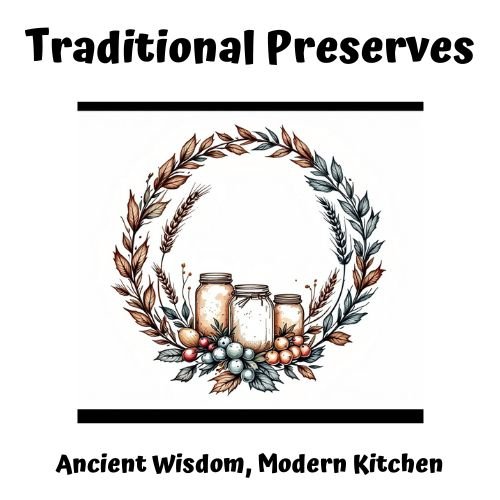
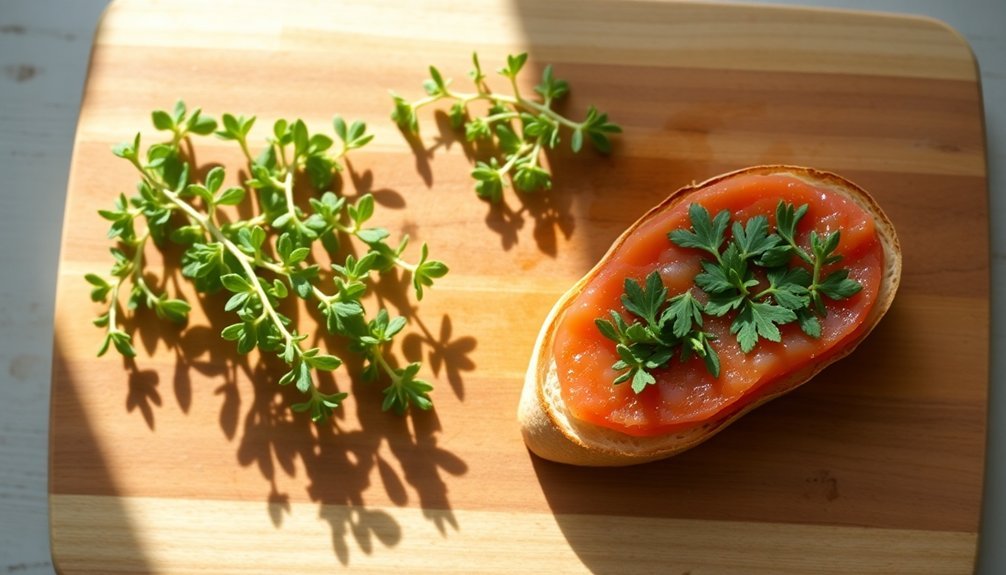
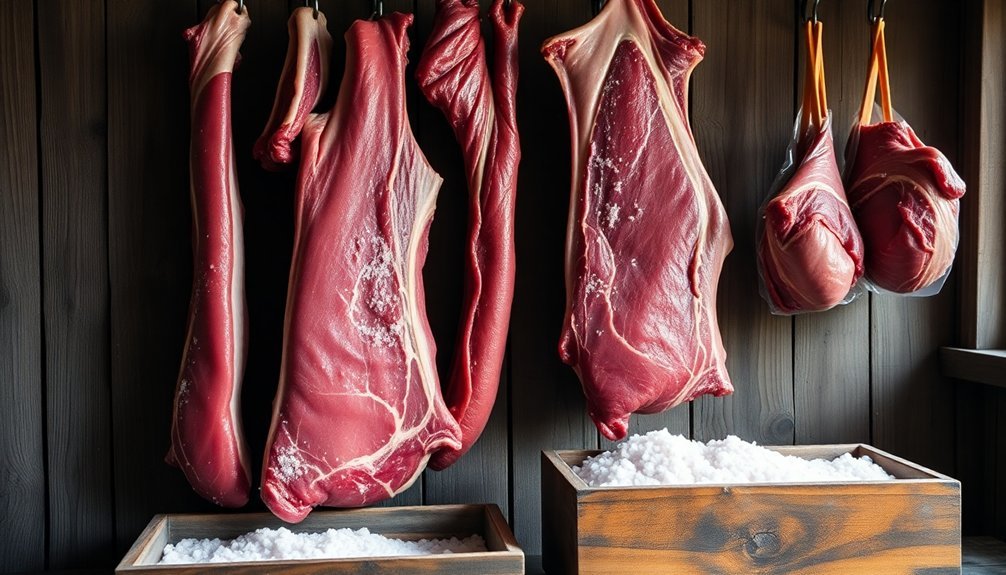
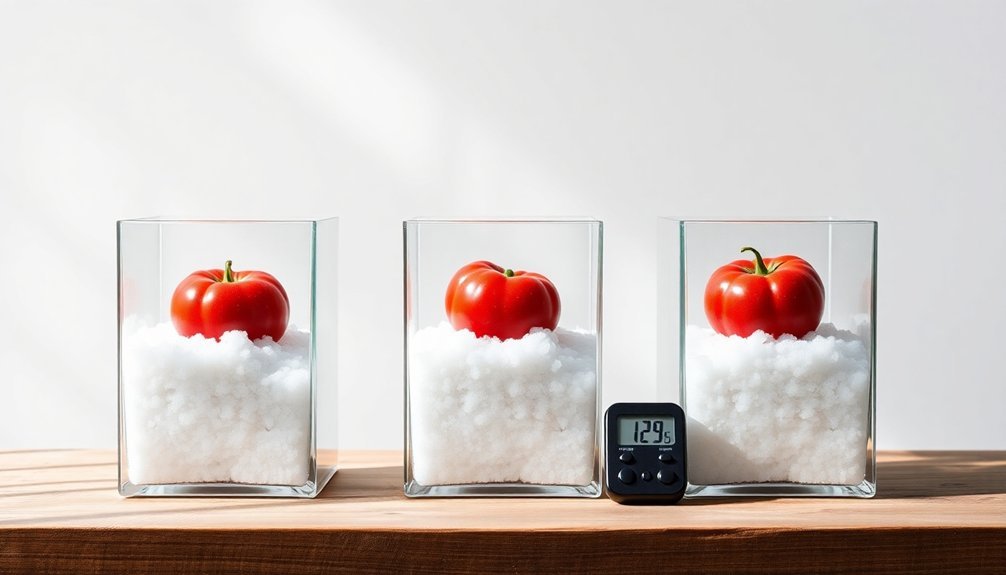
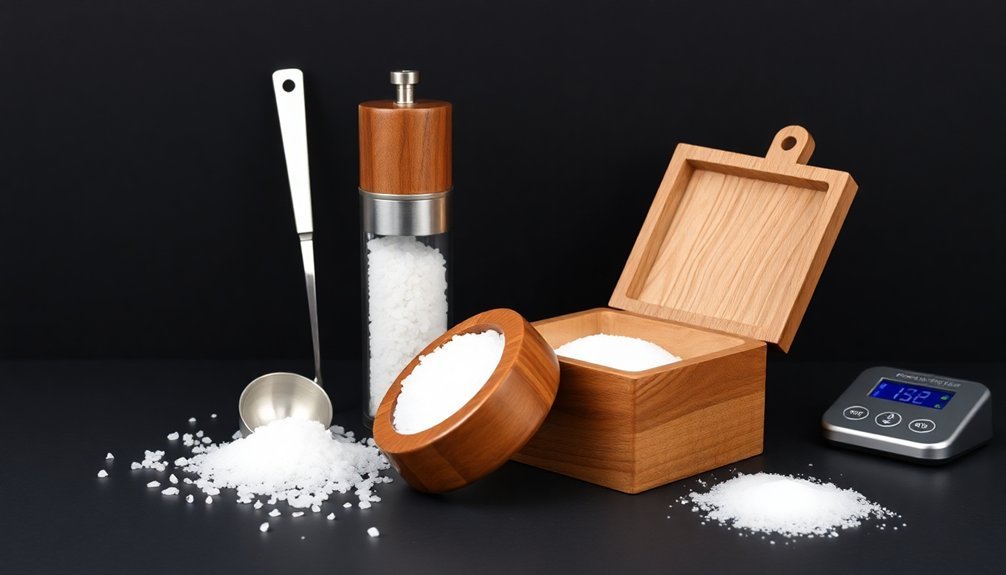
Leave a Reply